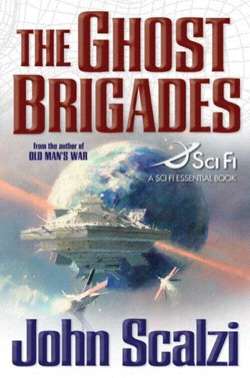John Scalzi, The Ghost Brigades
reviewed by Danielle L. Parker

|
|
The Ghost Brigades
Author: John ScalziPublisher: Tor, 2006 Hardcover: $23.95 U.S. Length: 315 pages ISBN: 0-765-31502-5 |
A few weeks ago I read a story that could have earned the newspaper that reported it a not-for-children rating in spite of the necessarily matter-of-fact tone of the article. The local Sacred Heart hospital was asking patients who had recently received transplants to come in for testing. Commercially minded ghouls had secretly broken into funeral homes. Contaminated cadavers had supplied donor material. Someone’s granddad went to his grave missing a tendon or two. Granny lost some skin.
It seems not even the dead can rest in peace when there’s money to be made from their mortal remains. There’s no respect for the sacred shell that once contained a living, thinking person today. The dead are meat in our necrophilic society. We’ve become the neo-Aztecs, selling and consuming the blood and tissue of our fellow human beings in our amoral pursuit of capitalism and extended life at any cost. If Granny still has her teeth, she’d better solder in those gold fillings good before she retires to her six feet of farm.
I was reminded of that story when I read The Ghost Brigades. Oh, that’s not because the author intended to raise any moral and ethical questions about the practices of organ harvesting in this story. Ghost Brigades is much simpler than that. You have your familiar military sci-fi here, a sub-genre that seems to be growing at a cancerously exponential rate. The questions the story raised in my mind are ones I’m sure the author didn’t intend.
That’s because the story reflects — or takes for granted — our own attitudes toward the dead. As a character in the story remarks, once you’re dead, your DNA doesn’t belong to you anymore. Thus, the Ghost Brigade of the title is an army of super-soldiers genetically engineered from the DNA of their former bodies. And once the former body has served its purpose, it sure makes good mulch for the food crops.
Jared Dirac is such a reincarnated super-soldier. But he’s a special case. His super-human body has been engineered from the DNA of a traitor, and his unwitting brain holds a copy of the turncoat scientist’s consciousness. Charles Boutin is a scientist who betrayed humanity’s biggest military secrets to its most dangerous alien rival and then somehow found a way to unite three of those said rivals in an unheard-of alliance.
But Boutin has disappeared. Humanity wants him back, dead or alive. Jared Dirac, it seems, may be the only key to finding the errant scientist.
The rest of this story is for those of you who love military sci-fi. We have the wish-fulfillment super-solider, tricked out with an on-board BrainPal computer in this instance, as well as the usual goodie super-weaponry. We have the usual description of said soldier’s training and military skirmishes and bonding with his fellow mates (man-to-man and man-to-woman, as women make good super-soldiers, too, it seems, and even provide the bonus of great no-apron-strings-attached sex).
The book’s easy to read (easy as in not difficult, mentally taxing, etc.). Jared makes a simple, one could say childish, narrator (in spite of the fact that his brain supposedly holds the consciousness of a genius, somewhere). That may be because he’s a baby, more or less, like most of his fellow soldiers. They’re force-fed all they need to know of life in a year or two and graduate to the tried-and-true manufactured grunt pattern. I guess no army wants a Schopenhauer. That human-will business would really be a serious liability.
Jared, of course, eventually confronts his progenitor, the traitor scientist, who’s not smart enough to have reasoned himself out of the old if-I’m-dictator-of-the-universe-I-can-save-us-all paper bag, it seems. Because this is an ultimately optimistic, feel-good military story, you just know Jared’s going to stick by his mates, and there will be plenty of shooting and heroism to satisfy any wannabe super-soldier in the showdown. If this is your thing, this is better-than-average example of the genre, I suppose. It moves, at least.
But it was unspoken cultural assumptions in this story that really interested me, because they’re ours. Once upon a time the dead were held as sacred remnants of human souls. Some societies, such as the Inca, even considered their sacred mummies as powers in their own right. It was not so long ago that our ancestors (my own Scots-Irish maternal grandmother, at least) honored their dead with lengthy wakes. I remember with undiluted exactitude a service I attended for a friend who died, at age eighteen, of cancer: the cloud of incense spread by the censer in the priest’s hand; the hypnotic rhythm of sitting, kneeling, chanting; the incongruously grand coffin that held the visage I could not bear to look upon; the communal weight of grief and regret; my acute anxiety that the heat of the room might bring me a whiff of unendurable decay. In order to extend our mortal lives, we have come to consider our dead as no more than tissue we can harvest and re-use. What have we really paid to gain those few more years of life? Far more than we should have, I think.
Copyright © 2006 by Danielle L. Parker

